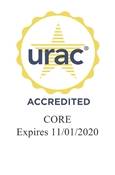Why Accreditation Matters for Patient Support Providers
By Dawn Herren, RN, MSN
Executive Q&A
Accreditation Matters

Q: In the healthcare delivery world, what is accreditation?
A: An accreditation is a transparent and comprehensive evaluation of an organization’s systems, processes and performance conducted by an impartial external organization. The external organization awards accreditation after ensuring rigorous criteria, consistent with national standards, has been met.
Q: What is URAC?
A: Founded in 1990, the Utilization Review Accreditation Commission (URAC) is the independent leader in promoting healthcare quality through accreditation, certification and measurement. URAC is a nonprofit organization developing evidence-based measures and standards through inclusive engagement with a range of stakeholders committed to improving the quality of healthcare. URAC's portfolio of accreditation and certification programs spans the healthcare industry, addressing healthcare management, healthcare operations, health plans, pharmacies, telehealth providers, physician practices and more. URAC accreditation is a symbol of excellence for organizations to showcase their validated commitment to quality and accountability.
Q: Why should a support program provider seek URAC’s Core Accreditation?
A: Lash Group sought accreditation for our Clinical Services and Adherence programs to demonstrate our commitment to a high-quality standard and continuous service improvement that benefits our manufacturer clients, patients and providers. Accreditation is a mark of quality that differentiates our adherence services for the clinical expertise and excellence of our support program team members.
URAC accreditation is a symbol of excellence in healthcare organizations that are committed to achieving quality and practicing accountability. The Core Accreditation from URAC validates that a clinical team has defined policies and procedures that allow team members to

quickly and effectively respond to the health concerns of their patients. It also confirms that support programs adhere to defined thresholds for telephone performance, such as average speed of answer by a live person, average abandonment rate and callbacks to patients.
Q: What is the process for accreditation? How long does it take?
A: Accreditation is renewed every three years and was most recently re-achieved in 2017.
Preparing for Lash Group’s initial accreditation in 2014 took more than 18 months, and our Clinical Services team worked very hard to align with URAC standards. URAC accreditation requires applicants to submit policies, procedures and other organizational information that is followed by a review. Once an application is received by URAC, a primary reviewer is assigned and coordinates all aspects of the review until a decision on accreditation has been determined.
URAC’s accreditation process enables learning and compliance with nationally recognized healthcare standards and supports improvements and innovation in healthcare management and delivery. URAC also offers educational content, including workshops, webinars, articles, issue briefs, videos and white papers.
From standardizing new processes and procedures to establishing metrics, our Lash Group and AmerisourceBergen partners spent a tremendous amount of time and effort developing and documenting work standards.
Q: How does the accreditation benefit manufacturers and patients?
A: URAC accreditation is a symbol of a support program provider’s dedication to delivering quality, continuous improvement and value to the manufacturers and patients it serves. The accreditation process has provided and continues to provide outside expert evaluation of the quality and safety of care and services the clinical team provides across all clinical services. Through accreditation, a support program provider demonstrates a continued commitment to quality service delivery and client goals.
Q: How does the URAC accreditation impact a support program provider?
A: A support program’s clinical team must be diligent in remaining in a constant state of readiness to demonstrate adherence to URAC Core standards. All team members are involved in the URAC process and are responsible for achieving quality within the scope of their role. The most committed support program partners continue to conduct annual internal audits for each department involved in the accreditation to ensure audit-readiness at any time. URAC may initiate an audit, without notice, anytime.
URAC accreditation creates a quality framework that is scalable across support program offerings and teams. For Lash Group, the URAC accreditation helps us to create a culture of excellence based in continuous process improvement. As accreditation requirements are modified to reflect current best practices in our field, it enables support program providers like Lash Group to stay on top of changing practices.



